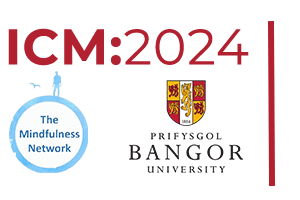ICM:2024 workshops, retreat, and training
conference workshops
Delve deeper into mindfulness with in-person workshops before and after the conference, set for Friday, August 2, and Tuesday, August 6, in Bangor. These workshops focus on specific aspects of mindfulness, adding depth to your overall conference experience. Each session offers a unique opportunity to gain valuable insights from experienced facilitators. With multiple workshops occurring simultaneously, you can tailor your time at ICM:2024, selecting the topics that resonate most with you. Access to workshops is included in the conference pass —buy yours now.
When grief is a collective and shared path it becomes more manageable. We realise as practitioners the importance and sacredness of grief, without fearing it or judging our healing pathway; and while grief is personal and happens in its own time and in its own way, every journey is different. Sometimes we simply don’t have the space to grieve, and we can find ourselves suffering years later but not recognise it as unresolved grief.
There are many situations that cause us serious pain and sorrow: life changing losses; the death of a loved one; a relationship ends; a pet dies, a job ends; divorce. Then there is everyday grief: a friend lets us down; our children struggle; we feel the loss of our roots and community. Our culture seems to encourage the ‘stiff upper lip’ and ‘moving on’. But it doesn’t have to be this way. There is no timeline for, or solution to ‘getting over’ or ‘moving on’ from grief. But we can learn to grow around our painful wounds and begin to come to a place of peace and remember with more love than pain. Grief isn’t something you simply “fix”; instead, it’s a process that you learn to navigate with time, patience, and self-compassion. Develop the skills and mindset needed to effectively cope with the inevitable ups and downs of grief, allowing you to find healing, growth and, ultimately, a renewed sense of purpose and meaning in your life.
Enquiry questions:
1. How do we work with our attachment and aversion to power to deepen our collective and nuanced understanding of grief as a tool of liberation?
2. How can we call forth embodied spiritual teachings within our lineages to help guide us in wielding personal and collective power with precision in the face of loss and in service of global change?
3. How do we best integrate after love and loss while simultaneously attuning to the need for protection of ourselves–and ultimately all others–on this path?
Join us for this beautiful opening ceremony and shared exploration and please bring some flowers or an object to build a communal shrine,
Contemporary mainstream mindfulness has been critiqued for its focus on individual outcomes to the neglect of wider systemic forces that shape our experience and sense of ourselves, including belief systems underpinning discrimination, and prejudice, and the recognition that our wellbeing is completely contingent on collective wellbeing. An over emphasis on common humanity and universality can lead us to avoid engaging with difference in all its richness and challenge. We can’t address causes of suffering or feel a sense of belonging without curiosity, validation, and recognition of each of our individual uniqueness.
This workshop will invite each of us to consider ‘this being human’ alongside being this human being. We will shine a light on how it is to be a human being in this particular moment in history. We will explore how these dual considerations might inform next steps for us as individuals and collectives to support us to integrate a social lens in our mindfulness practice, teaching, and research. What might be needed for our mindfulness practice, teaching and research to become more inclusive, contextualised, and relatable so that it both benefits individuals and wider society?
We will explore the relevance and power of MBSR when it is rooted in lived experience and tinged with the humility, vulnerability, and fortitude required to take a closer look at what it is to be an evolving socially aware human and lifelong learner.
The day will be held in a community of practice framework designed to facilitate each of us in bringing a kind, courageous beginners’ mind to exploring together how MBSR has emerged, where it has been, and where it can go amidst our collective global concerns.
To this end, this workshop will be about encouraging a collective exploration of the perceived moral and ethical boundaries of the individual, secular, social and spiritual practice of mindfulness, through an explicitly inclusive social lens that is rooted in justice, equity, diversity and inclusion or what we like to call JEDI work.
The workshop will feature a blend of guided mindfulness exercises, group discussions, presentations and practical activities. Participants will have the opportunity to reflect on their personal relationship with the environment, share experiences, and develop actionable plans to collaborate with others working in the field or incorporate mindfulness into their personal efforts to address the climate crisis.
This workshop is designed for academics, environmental activists, mental health professionals, and anyone interested in integrating mindfulness into their approach to addressing the climate crisis. No prior experience with mindfulness practices is necessary.
Drawing on its rich experience (since 2009), as well as that of others in the field, this workshop will be facilitated by Mindfulness in Schools Project (MiSP). Our hope is to open up a dialogue of mutual inquiry, hearing and learning from one another, collectively exploring what mindfulness might look like in future generations. It will include an opportunity to hear the latest research overview from Professor Katherine Weare; insights from children and young people themselves; an overview of lessons learnt in the development of school based mindfulness, introducing a framework that offers diverse entry points and a range of paths to introducing and sustaining mindfulness within and for educational communities, including: a mindful approach to any role in a school; mindful subject teaching; discrete teaching of mindfulness to students; supporting school mindfulness teacher communities, and intentionally developing a whole school culture that embodies the values, qualities and attitudes of mindfulness.
This workshop will also hear reflections on the recent inspirational work by Esther Ghey (mother of murdered British teenager, Brianna) to fund the mindfulness training of a teacher in every school in Brianna’s home town of Warrington, as well as raise awareness of mindfulness with media and decision makers. We are delighted that Esther will be able to join to share her perspectives as a parent, mindfulness practitioner and Director of new CIC, Peace and Mind UK, and that Emily Slater (CEO of MiSP) will join her for this.
Known for its age specific curricula, this workshop will be sure to also include a taster of MiSP’s newest curriculum, tailored at our youngest learners, 3-6 year olds, as well as from The Present’s curriculum for schools, with an opportunity to hear directly from The Present Director and curriculum author, Sarah Silverton, as part of sharing a new official collaboration between the two organisations.
This is a workshop open to all, and will be an opportunity also for educators and anyone caring for children and young people in a professional or personal capacity or passionate for other reasons to join together and network. If you care deeply about future generations and ensuring as many people as possible access mindfulness in their lives? We hope this workshop will offer you practical tools and inspiration.




